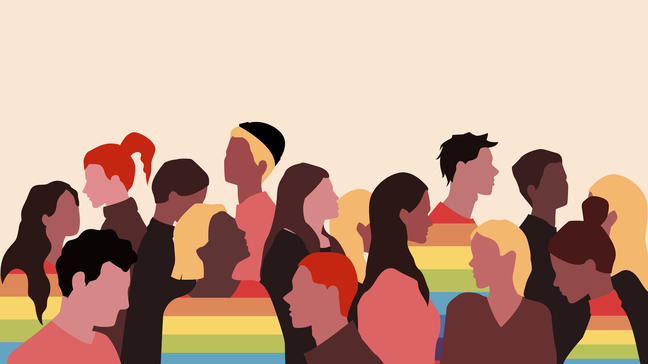Applying to college is a scary time. You’re stuck with writing essay after essay, you need to take exams, pay to apply, and the list goes on and on. But for LGBTQ+ students, the list of new tasks can be longer. Unfortunately, finding the right college that meets all of their academic needs and supports their identity is harder than it should be.
To make the process a bit easier for LGBTQ+ college students, I’ve outlined a few important steps you can take to make sure you’re choosing the right school.
Issues LGBTQ+ College Students Face
LGBTQ+ students may face numerous challenges in their college careers, including:
- Harassment. According to the GSLEN National School Climate Survey, 90% of LGBTQ+ students experience harassment or assault based on personal characteristics, including sexual orientation, gender expression and gender identity.
- Providing housing. Some LGBTQ+ students face harassment due to college housing situations. In particular, transgender students may find it difficult to obtain housing that matches their gender identity and may be uncomfortable asking the school to change housing.
- The search for fair athletics. College athletics is generally divided into two gender categories: men and women. This can be confusing for transgender and non-binary students who often struggle to participate in sports and extracurricular activities.
- Getting the right financial help. For students who do not have a healthy relationship with their parents, the FAFSA can be difficult, especially if they do not qualify for independent student status. A financial aid office that understands and sympathizes with this situation is not always easy to find.
Filling out the FAFSA yourself
When you apply to college, you will face the same fate as everyone who came before you: you will need to complete the FAFSA. The free federal student aid app is the best way to get government funding for your education. This is the first route any student must take before applying for private loans.
Read more: Money Under 30 Guide to Completing the FAFSA
For LGBTQ+ students, many of whom don’t have family support when applying to college, applying to the FAFSA can be incredibly daunting as much of the form involves filling in the financial information of your parents or guardians. LGBTQ+ students who may have family problems will not have easy access to this information.
One of the only ways to bypass the parent part of the FAFSA is to declare yourself an independent student. Emancipated minors as well as married students and homeless young people can apply as independent students. As an applicant of this type, you will go through the normal FAFSA procedure but skip the parent part.
Read more: What is an independent student at FAFSA?
What if I cannot declare myself an independent student?
If you don’t qualify as an independent student – say you don’t communicate with your parents, but you’ve never officially been declared emancipated – there is a place where you can report special circumstances to the FAFSA.
Unfortunately, this does not guarantee that you will receive the funding you expect, so be sure to contact the financial aid department at the colleges you have been accepted to and ask what they can do, if anything.
Scholarship opportunities for LGBTQ+ students
For students who self-identify as LGBTQ+, there are numerous scholarships available that can help you pay for your education. While many of these scholarships won’t cover all of your tuition, any small amount you can get will help.
A few specific scholarships include:
- LEAGUE Foundation Scholarships – The League Foundation offers several different scholarships for LGBTQ+ students ranging from $2,500 to $4,000. Students must be high school graduates in the year they apply.
- Out to Innovate™ Scholarships – LGBTQ+ STEM students and alumni can apply for three different scholarship options ranging from $2,000 to $5,000.
- Pride Foundation Scholarships – LGBTQ+ students living in Alaska, Idaho, Montana, Oregon, or Washington DC can apply for a Pride Foundation Scholarship. There are over 60 scholarship options, but you only need to complete one application to apply for them.
- Aritzia Scholarship. Founded by Aritzia, a fashion retailer, this scholarship is offering LGBTQIA students (four per year) one-time $5,000 scholarships to be paid directly to schools.
- Traub-Dieker Rainbow Scholarship – Founded by Peggy Traub and Phyllis Dicker, this scholarship supports students who identify as lesbians in pursuit of higher education. Several students receive a one-time $4,000 scholarship. These scholarships are paid directly to schools.
- Little Bird Scholarship. LGBTQ+ students who are also undocumented immigrants, refugees, and asylum seekers or asylum seekers can apply for the Little Bird Scholarship. Students can receive $18,000 for two years of study.
- Levin-Goffe Scholarship – LGBTQ+ or intersex students who are also undocumented immigrants studying in New York City can receive $25,000 for up to two years of tuition if they are in their second year of college.
This is a small selection of available scholarships. If you’re in high school, ask your school counselor to look into other options and they can put together a list. A simple Google search can also lead to state-specific options.
Read more: Scholarships and grants: how to raise free money for college
In search of a queer-friendly college
When you start looking for a school, you are of course interested in the education it provides and the extracurricular activities you want to participate in. But as an LGBTQ+ student, there are a few more factors you need to think about. You must ensure that the school(s) you choose are homosexual friendly.
Here are some of the most gay-friendly colleges in the country:
- Agnes Scott College
- Bard College
- Smith College
- Mount Holyoke College
- brown university
- College of the Atlantic
- Harvey Mudd College
- Oberlin College
- New York University
However, apart from the college ranking, there are several other factors you should consider. Research the policy of discrimination in your best bet and consider the actual location of the university. Is it off campus where you want to be? Is it in the reception area? You will have to go out into the city more often than you think, so make sure you live in an area that you like.
Understanding your rights as an LGBTQ+ student
Even schools with the best intentions can make mistakes and discriminate against students. You have rights in certain situations, including:
- Freedom of expression Colleges can’t tell you that you can’t go out or talk about LGBTQ+ rights on campus. Public colleges must respect the constitutional right of expression.
- Right to privacy The college cannot kick you out without your permission.
- Title IX defense – Title IX protects students who are victims of sexual abuse or harassment. This also applies to LGBTQ+ students. Schools are required to respond promptly to acts of violence, regardless of the gender of the perpetrator or victim. Title IX also protects the rights of transgender students to fair and equal educational opportunities.
Understanding these rights will help you get equal and fair opportunities. If you believe that the financial aid department or any other department at your university has violated any of these rights, you can report it to the ACLU, who will help you file a case.
Resources when you become a student
Many colleges have begun dedicating resources to the LGBTQ+ community by offering help to students who have long faced discrimination in higher education. When searching for colleges, the most supportive schools will have the following:
LGBTQ+ Resource Centers
Many colleges have LGBTQ+ centers designed to help LGBTQ+ students feel comfortable on campus. When searching for schools, do a quick search and see what the school has to say about a resource center like this one.
If you have specific questions, you can even write to the contact person. In my experience, they are more than happy to answer questions from curious potential students.
LGBTQ+ clubs
Many colleges have clubs for LGBTQ+ students. They range from support groups to activism clubs. My college had over a dozen options to choose from, which made me feel a lot more comfortable as an LGBTQ+ student. This made me feel that my university recognizes the importance of having such groups.
Campus Support Activities
College campuses have speakers from a wide variety of backgrounds to give students insight into the various communities. You must ensure that your school has LGBTQ+ representatives.
LGBTQ+ courses
One of the core subjects required for my college was a course in social justice. It is very important to be able to understand other people’s points of view and to understand social justice issues that apply to different communities. Many schools have gender studies, women’s studies, and queer studies programs. If you are interested in studying these subjects professionally, find out exactly what options are offered by the schools of your choice.
Summary
LGBTQ+ students will want to choose a college that not only supports their identity, but also has the necessary resources to help students thrive. Be sure to take advantage of the many scholarships available for LGBTQ+ students and understand the rights you have as a student. Also, take advantage of the resources your school has to offer. They are here to help!


